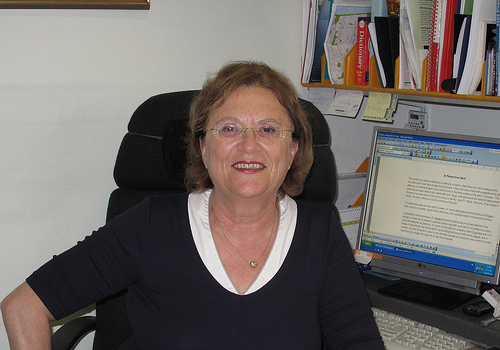In a study published today in the European Journal of Vascular and Endovascular Surgery, Dr. Britta Hardy from the Sackler School of Medicine at Tel Aviv University and her colleagues reveal a mechanism for restoring the tissue of the small blood vessels in the leg that was blocked as a result of blood insufficiency due to diabetes

Dr. Hardy and her colleagues characterized a number of peptides - tiny proteins, containing combinations of 12 amino acids which in previous experiments indicated that they cause the development of small blood vessels in tissues suffering from a lack of oxygen supply and stimulate the process of restoring damaged blood vessels. The work of identifying those peptides was lengthy, but in the end the relevant combinations were discovered, and they were transferred to synthesis and production in large quantities for the purpose of the experiments.
"The peptides we uncovered bind to the cells that line the blood vessel walls and reveal a target protein that is expressed under conditions where the blood vessel is in a lack of oxygen - one of the family of stress proteins. After finding the correct combination from a random peptide inventory, we searched for similar sequences within proteins found in the human body. We discovered that an important part of the same peptide that was previously identified from a random pool is also present in the body as a derivative of a natural protein," explains Dr. Hardy.
"We saw that when we inject these peptides from the two different sources into animals with ischemic tissue, they significantly improve its condition." says Dr. Hardy.
In studies published by the group last year, it turned out that the addition of these peptides that bind the Aka protein on the cell walls prevents the death of cells caused by ischemia. Since it was clear that the death of the small blood vessels in the feet of diabetics was also due to ischemia, the team members wanted to conduct experiments that would confirm this. Indeed, Dr. Hardy examined the activity of peptides in ischemic tissues against the background of diabetes. It turns out that while in ischemic tissue without diabetes there are also natural mechanisms for creating blood vessels that contain growth factors, while in ischemic tissue with a diabetic background these mechanisms are inactive, while the peptides that work in a different mechanism - not as growth factors - were not affected by the diabetic background.
"Within a short time we saw the creation of capillaries - the parent cells of blood vessels as well as tiny blood vessels. Within three weeks these blood vessels merged and connected to the circulation. In research models of experimental animals where blood flow was limited due to diabetes, we were able to completely restore the blood vessels and save their legs. The legs of diabetic laboratory animals that received an injection of the peptide were restored and they stopped limping within three weeks like their non-diabetic friends, and their condition was immeasurably improved compared to their diabetic friends who were not treated with the peptides. It was a small step towards applied research in humans." Dr. Hardy explained.
In this there is new hope for diabetics, which was dashed after previous studies that tested other substances known as growth factors using the same experimental method showed that the same substances are only able to improve the condition of injured mice who are not diabetic, however, most of the leg amputations are performed on diabetics and there has been no answer to these until now.
In the future, Dr. Hardy wishes to conduct clinical trials and inject the peptides into diabetic patients who are awaiting leg amputation, and who have nothing to lose.
"Unlike studies in other drugs, clinical results in blood vessels are immediate. In a short time we see if the regrowth of blood vessels occurs or not, our technology promises to grow blood vessels in the form of a network when the leg itself will grow more blood vessels and connect them to the network. In the distant future, injecting peptides into the body will eliminate the need for leg amputations." Dr. Hardy concludes.

7 תגובות
Hello Berta
I have been diabetic for about two years and try to be balanced and fail. I have a problem
Terrible pains in the legs, what do I do? There is a fear that it will not reach a state of necrosis
This is very important, giving hope to many diabetics. It must be remembered that a correct balance can prevent complications, there are many options, the insulins these days are advanced and convenient to use like Lantus for example, it is true that it is important to pay attention to everything you eat but this can prevent problems in the future.
Very interesting.
I am ready to contribute new information that can prevent leg atrophy as a result of circumcision.
I tried treating the circumcision with coffee. The attempts were made on myself. The amazing results were obtained from taking tiny amounts of coffee in the evening. These amounts not only canceled the circumcision but improved the motor and cognitive function in the third age. After a while, the situation stabilized and I stopped taking coffee.
I am now 80 years old. The improved condition has been going on for over five years. I would like to pass the information on to doctors so that they can test it in a controlled manner on many patients and maybe this simple measure will help them, as it helps me. If you are interested, I will send you a detailed summary of my observations in Hebrew or English.
Eli Berger
It's a shame we don't have 10 times more researchers working on medical breakthroughs.
Hope for the restoration of a damaged heart
Fascinating!